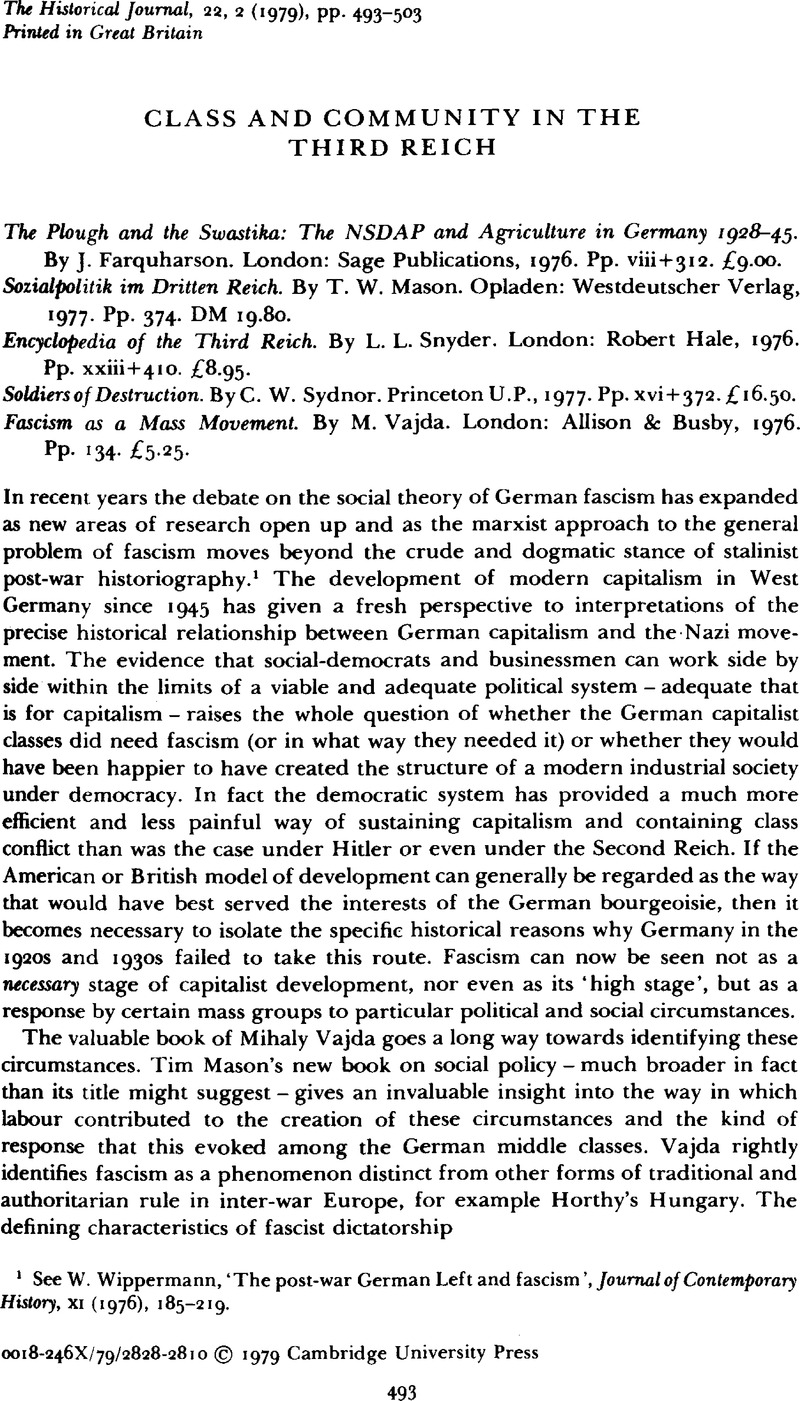No CrossRef data available.
Published online by Cambridge University Press: 11 February 2009

1 See Wippermann, W., ‘The post-war German Left and fascism’, Journal of Contemporary History, XI (1976), 185–219CrossRefGoogle Scholar.
2 Vajda, Fascism as a mass movement, p. 15.
3 Ibid. pp. 19, 41.
4 Grunberg, E., ‘The mobilization of capacity and resources of small-scale enterprises in Germany’, Journal of Business, XIV (1941), XV (1942)Google Scholar; Egle, W., ‘The progress of mass production and the German small-scale industries’, Journal of Political Economy, XLVI (1938)Google Scholar.
5 Numbers rose from 1,307,000 in 1926 to 1,395,000 in 1931. See Grunberg, , ‘Small-scale enterprises’ (1941), pp. 334, 336–7Google Scholar.
6 Ibid. pp. 337–8.
7 Heaton, H., Economic history of Europe (New York, 1948), pp. 441–3Google Scholar. The size and number of holdings was as follows:

(Source: Statistisches Jahrbuch für das Deutsche Reich (Berlin, 1938), p. 82)
8 Clapham, J., Economic development of France and Germany, 1815–1914 (Cambridge, 1936 edn), p. 219Google Scholar.
9 Wynn, A., ‘A note on German agriculture’, Economic Journal, XLIII (1933), 518CrossRefGoogle Scholar; Gerschenkron, A., Bread and democracy in Germany (Berkeley, 1943)Google Scholar.
10 Wynn, ‘A note on German agriculture’, p. 519.
11 Speer, A., Inside the Third Reich (London, 1971), p. 22Google Scholar; Irving, D., The rise and fall of the Luftwaffe (London, 1972), p. 24Google Scholar.
12 Speer, Inside the Third Reich, p. 19, who gives a brief personal account of his growing conviction of the threat of communism.
13 Mason, T. W., ‘Labour in the Third Reich’, Past and Present, XXXIII (1966)Google Scholar.
14 See the discussions in Rich, N., Hitler's war aims (2 vols., London, 1973–1974)Google Scholar; Hildebrand, K., The foreign policy of the Third Reich (London, 1973)Google Scholar; Jäckel, E., Hitlers Weltanschauung (Tübingen, 1969)Google Scholar.
15 Kluke, P., ‘Hitler und das Volkswagenprojekt’, Vierteljahrshefte für Zeitgeschichte, VIII (1960)Google Scholar; Overy, R. J., ‘Transportation and rearmament in the Third Reich’, Historical Journal, XVI (1973)Google Scholar; Lochner, L., Tycoons and tyrants (Chicago, 1954), ch. IXGoogle Scholar; Simpson, A. E., ‘The struggle for control of the German economy’, Journal of Modern History, XXI (1959)Google Scholar.
16 For example Schweitzer, A., Big business in the Third Reich (Bloomington, 1964)Google Scholar.
17 See Merkl, P., Political violence under the Swastika (Princeton U.P., 1975)Google Scholar.
18 The completed stretches ran mainly north-south by 1939, not east-west. The figure Snyder gives of 70,000 working on the roads by the construction peak should be 120,000. Overy, ‘Transportation and rearmament in the Third Reich’, pp. 393–4.